Can You Still Use Water if Your Water Heater Is Off?
Author: Omar Alonso | Editor: Omar Alonso
Review & Research: Jen Worst & Chris Miller
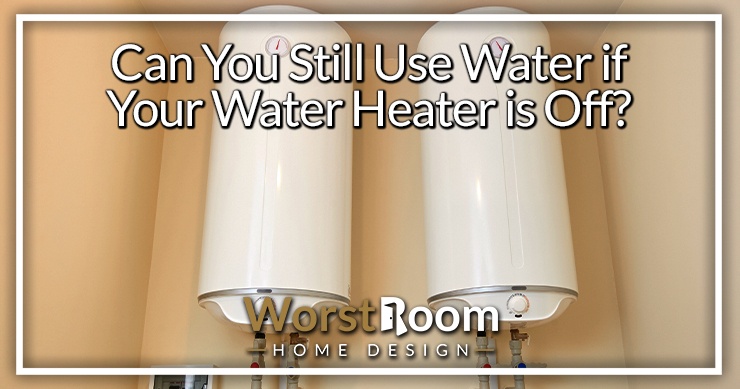
Can you still use water if your water heater is off? You want to wash the dishes after dinner, and the power failure on the block is still going on since this morning. The technicians say it's going to be another few hours before they restore the system. That means the water heater isn't running.
Can you run the dishwasher, or are you going to have to leave the dirty dishes in the sink until tomorrow?
Tankless Vs. Storage Tank Water Heater Models
A water heater is a single-purpose appliance with a single critical function in the home. Its only job is to heat water, which means anything requiring hot water for its operation might not work if it's off. Most types of water heaters heat water and pump it into an insulated storage tank for use, but others don't use a storage tank.
It doesn't matter if the water heater has a storage tank or not; you'll be able to run water through your faucets and the shower. However, whether or not you have a storage tank and how long ago the water heater was turned off makes a difference in whether you have hot water available or not.
Gas Vs. Electric Water Heater Models
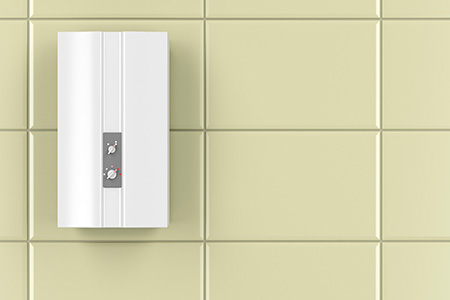
You have options for gas-powered or electrical water heaters in a storage tank and tankless designs. The electrical models rely on electricity for operation. So, if the power is off, they stop working. A tankless electrical model will provide hot water once the power comes back on, and, as mentioned, the storage tank models will have limited hot water available.
However, the gas-powered model doesn't rely on electricity for operation. If your home has a power failure, you still have access to hot water. As with the electrical models, gas-powered water heaters come in tankless and storage tank designs.
Can I Shower If My Water Heater Is Off?
Let's say you're installing a new water heater as quickly as you can but need to take a break. Can you still use water if your water heater is off? You can but it won't stay hot for long or may already be cool. If you have a storage tank, the water will slowly start losing heat over time. Typically, the water remains hot for a few hours, then gradually loses temperature. After a few hours, it's cool again.
If you need to run the dishwasher or washing machine or take a hot shower, you can squeeze it in if the heater only went out an hour or two ago. Keep in mind that if you've removed your shower head flow restrictor you're going to use more hot water faster.
However, after using up the hot water in the storage tank, the system pumps cold water back into it, and there's no more hot water until it comes back on. However, if your water heater doesn't have a storage tank, and some models don't, you will only have hot water once the unit returns to operation.
If it's been several hours since the heater was off, your only choice is to have a cold shower. We hear that's a "hot" trend right now, so maybe it won't be that bad. But since you're working on the water heater, now is a good time to make your shower water hotter.
Should I Switch Off My Water Heater While I'm Away on Vacation?
If you're going away on vacation, turn your water heater off. This strategy saves energy, and you don't waste electricity from heating water while not using hot water at home. The only problem with this idea is that you will only have hot water when you get home from your trip once the heater fills the storage tank.
Of course, if you have a tankless direct water heater that doesn't rely on a storage tank, you'll immediately have hot water. These models superheat the water as it passes through the unit, providing instant access to hot water.
Water Heaters & the "VAC" Setting
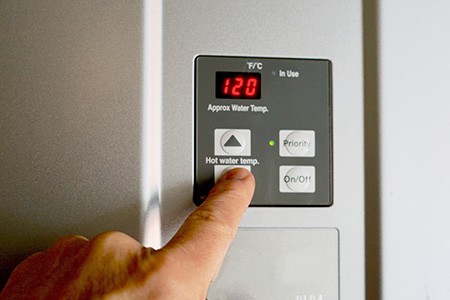
Some of the new models of water heaters using storage tank facilities offer a "VAC" or "Vacation" mode built into the unit. The VAC mode maintains the water temperature at 50 degrees Fahrenheit. As a result, the water heater requires much less energy to keep running, saving you on your electricity when you're away from home.
When you return, you turn the setting back to the normal operating mode, and it takes the heater a lot less time to get back to normal working temperature. It takes a lot of energy to heat cold water, especially in frigid regions of the country during the winter. So, leaving the water heater in VAC mode reduces the time and energy required to get the water up to temperature.
In most cases, the energy required to keep the tank warm on VAC mode is less than needed to heat the water from ice cold when you return home. Leaving the heater on VAC mode is a great way to save energy costs if you're going away for five days to a week.
Plus, it takes less time to heat the water tank up when you get back, meaning you can jump in the shower and get rid of the jet lag sooner than if you're waiting for the water to heat up from ice cold. Don't drain it, that's not necessary, and it'll keep you from encountering issues with your water heater not filling back up.
Can You Still Use Water if the Water Heater is Leaking?
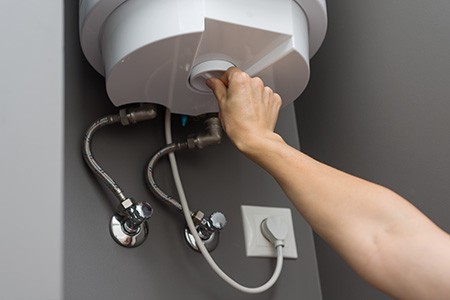
You might notice your water heater starts losing performance, and the water isn't as hot as it usually is. This is normally a sign that the system has a leak. Can I take a shower if my water heater is leaking? You can still use the water heater if you're collecting the leaking water safely and it's not leaking out onto your floor.
But you should act quickly. You'll need to turn the water heater off immediately to prevent damage to the system. Call a plumber and get them to come to your property to inspect the unit and the tank. It will likely need to be drained.
There are several reasons why the water heater might be leaking:
- Damage to the storage tank
- Loose fixtures or drain valves
- An over-pressurized system
- Poor drainage
- Your water heater is old and needs maintenance or replacement
Can you still use water if your water heater is off? Yes, but do not continue to use a leaking water heater for long term. As soon as you discover the problem, you need to use the water that you need immediately and be prepared to turn it off and handle the problem.
Some people ask can you shower with a broken water heater, like with the voltage low warning on the thermopile, and the answer is depends on why and how it's broken. If it can still hold water and pass it through to the shower, then yes, but obviously it won't be hot water coming out of the shower head.
Maintenance Scheduling of the Water Heater
Every appliance needs maintenance from time to time to ensure it remains in working order, and the water heater is no different. It's common for the system's anode rod to fail, resulting in the unit's malfunction.
Ensure you maintain your water heater properly, and you'll get a longer service life out of the unit. Most manufacturers will recommend a servicing schedule for the heater; you'll find it in your owner's manual.
What Are the Signs a Water Heater Needs Maintenance?
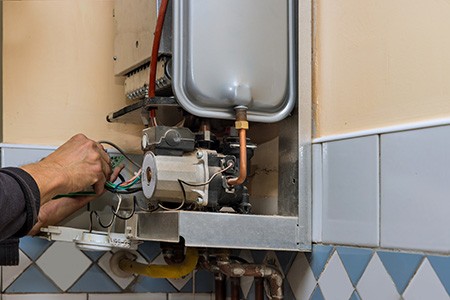
If your water heater starts making weird noises, it's a sign that it's experiencing problems and needs maintenance. Gurgling, banking and popping are common noises associated with this issue.
If you notice discoloration in the water coming out of your taps, it's a sign of rust building in the system, requiring maintenance to remove it.
If you find the hot water runs out quickly, it's a sign that the water heater is about to fail shortly.
What Is the Average Water Heaters Service Life?
Depending on the model, your water heater may offer a service life of anywhere from 8 to 12 years. There's a broad range of dynamics into why the service life varies so widely. Tankless models tend to last longer than those using storage tanks because it removes one of the failure points from the system.
Here are some other factors influencing your water heater's service life:
Failing to Flush the Tank – Flush your water heaters tank once a year to remove the sediment. Failing to flush the tank draws sediment into the system, resulting in blockages.
Your Area Has Hard Water – Hard water contains more minerals, like calcium, that create deposits in the system, leading to blockages.
Over-Pressuring the System – If your home's water pressure is too high, it places strain on the tank, causing premature failure of the system.
What Causes the Water Heater to Flood?
The most common cause of water heater flooding is a build-up of pressure in the system. Over-pressurization usually occurs because of sediment build-up in the tank or if the temperature setting on the unit is too high.
It's a dangerous occurrence because there's also the potential for the water heater to explode, causing damage to things around it or starting an electrical fire. If you notice any issues with your water heater, turn it off immediately and call a qualified plumber or service agent to look at the unit.
How Do I Dispose of My Broken Water Heater?
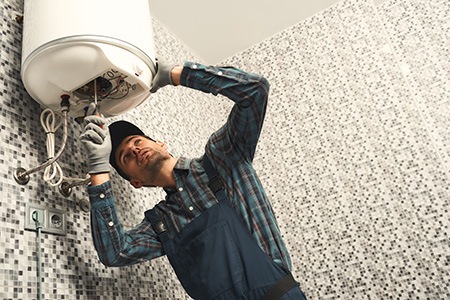
Eventually, all water heaters reach the end of their service life and fail beyond repair. If that's the case, you'll need to replace it.
Make your decision for a unit based on the information you learned from this article. Tankless or storage tank? Gas or electric-powered? The choice is up to you and depends on your preferences.
You'll need to dispose of the old heater properly. Take it to a recycling center or the landfill, depending on the options near you.
Most cities don't allow you to leave it out on the curb for collection by the garbage truck. They can't dispose of these items in their vehicle. When you buy a new one to install, don't lay the water heater on its side.
Key Takeaways on Using Water if the Water Heater is Turned Off
Let's recap the main points we've covered above to re-emphasize what we've learned:
- Yes, you can still use the water in your home if the water heater is off.
- If you have a model with a storage tank, you might have hot water available for a few hours after it switches off.
- Tankless models won't deliver hot water until the electricity comes back on.
- Gas-powered models don't rely on electricity, so they'll keep working if the electricity goes out.
- There are several reasons why a water heater might malfunction. Turn it off if it's not working correctly, and call a professional to assess and fix it.
As you can see, you can use your water, period. The second question is whether or not you'll have hot water, and that'll depend on the type of water heater you have.
So, Can You Still Use Water if Your Water Heater is Off?
Yes, if your water heater is off, it will still allow water to pass through it. It won't be hot water, especially if the water heater has been off long enough to let the heat dissipate in the storage tank (if your's even has a storage tank). So, can you still use water if your water heater is off? You can, just don't expect heat!



